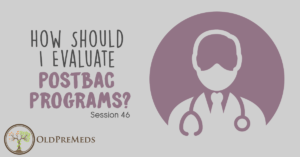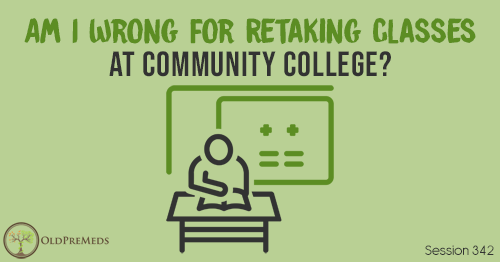Apple Podcasts | Google Podcasts
Session 46
This week’s question is coming from a 36-year old, single mother of three who is looking to get into medical school. Listen in as Ryan and Rich share their insights into how you can actually evaluate postbac programs.
Your questions, answered here on the OldPreMeds Podcast. Ryan and Rich again dive into the forums over at OldPreMeds.org where they pull a question and deliver the answers right on to you.
OldPreMeds Question of the Week:
Poster is looking at UCLA postbac program, part of the UCLA Extension School; she said it’s the only program that doesn’t require a GPA minimum but she’s concerned if this is going to hurt her appearance at medical schools because of this.
How should a nontraditional student evaluate postbac progams?
Here are the insights from Ryan:
- Evaluate the logistics of your life.
A young single student has different concerns than a mom of three. Go to the best school if you can. But if you don’t have time logistics to study, you’re not going to be successful. So evaluate what you need.
- The GPA point of interest is not a valid concern.
Medical school are not going to worry what GPA you had going into a postbac but they’re going to worry about your GPA coming out of the postbac.
Some things you need to consider:
- Is it going to be in the morning or the evening?
- Is it a full time system or part time?
- What is the cost?
- Do you need an advisor?
- Do you need a prep course for MCAT?
- Are there any links for this postbac?
- Does it have any connections with medical school?
- Does it have any EC coordination?
- Place for training or research
- Success rate (Be careful of this.)
- Find out what their stats and requirements are. (Not having a committee or composite letter from them is a big red flag.)
You can do an informal postbac.
This means not going through a formal postbac program but rather, you take the courses that you need to improve especially if you have low GPA.At this point, advising for this particular case is very important.
There is no MSAR for post bac.
There is no standardization.
Links and Other Resources:
In celebration of The Premed Years podcast, Ryan is holding a contest where you can get a chance to win some one-on-one coaching with Ryan. Simply head over to www.medicalschoolhq.net/contest to join.
Transcript
Introduction
Dr. Ryan Gray: The Old Premeds Podcast, session number 46.
You’re a nontraditional student entering the medical field on your terms. You may have had some hiccups along the way, but now you’re now ready to change course and go back and serve others as a physician. This podcast is here to help answer your questions and help educate you on your nontraditional journey to becoming a physician.
Welcome back to the Old Premeds Podcast if this is not your first time joining us. If this is your first time joining us, welcome, I’m glad to have you here. We take questions directly from the www.OldPremeds.org forums and answer them here on the podcast. So if you are not a member over at the www.OldPremeds.org forums, go sign up and say hello.
This podcast episode is an interesting one, and one that I can’t believe we haven’t really covered before, but it’s all about postbac programs and really how to evaluate them. So let’s jump in.
Rich, welcome back to the Old Premeds Podcast. How are you doing today?
Richard Levy: I am just spectacular. Yourself, Dr. Ryan?
Dr. Ryan Gray: I’m doing great, thank you. So this week we have another postbac type question, this time from a student that is a single mother of three, 36 years old, looking to get into medical school now kind of fulfilling her dream. She was looking at UCLA’s postbac program which is part of the extension at UCLA, the extension school, and she has some questions about- basically concerns. She says it’s the only program where they don’t require a GPA minimum which is interesting. So for that person that we recorded last week that was worried about her GPA and finding a postbac, maybe the UCLA extension program is an option for you. But so this poster has some doubts about if that is going to hurt her appearance to medical schools because they don’t have a minimum GPA, and so she’s asking people if it’s a good school if anybody’s been through it, but really what it comes down to, a lot of her concerns are probably what a lot of students have concerns wise when they’re looking into postbac programs. Number one, they’re not cheap. And number two, students are usually doing it because their goal is to get into medical school and so they have this question in their head, ‘Is this school really going to help prepare me to get into medical school?’ So Rich let’s break down this question and really ask the main question, is how should a nontraditional student evaluate postbac programs?
Postbac Programs
Richard Levy: For some students, they really have to first evaluate I’m going to say the logistics of their life, right? Somebody who’s 26 and has financial backing from the parents who looks for a postbac and has time has different concerns than say our person here who’s a single mom of three. She has timing issues, course issues, et cetera, et cetera. So you have a whole bunch of things you [Inaudible 00:03:31]. So first you have to see what’s going to fit with my life, and I always like to tell people this, go to the best school you can but if you don’t have time logistics to study, if you have to worry about when the courses are, if you have to rush to go to places, you are not going to be successful in it. So first thing is evaluate what you need. Her concern concerning the GPA upon entrance I think is not a valid concern. I don’t think med schools are going to worry what GPA you had going into a postbac, they’re going to worry about what GPA you had coming out of the postbac. So that I think is the least concern possible. Other things about it is especially timing, when are the courses? Are they just daytime? Are they evening? Is it a formal program where they just have a full-time system? Is it part-time? Those sorts of things. Obviously the cost as well. Some students don’t take a formal postbac because- for example I know a school here in the east where the formal postbac is a graduate level- is run as a graduate certificate program with graduate credit course costs, yet you’re in the same courses as the undergraduate. So if you took it as a non-matriculating undergraduate, you would be in the same exact courses the people in the postbac are in, and you’re paying literally three times as much. Alright? So why do that? Now you may get things being in the formal. Do you need advising? Do you need a prep course for MCAT? Is it included? Are there any links for this postbac? Does this postbac have any connections with medical schools? Does the postbac have any EC coordination? That is some schools here have connections for volunteering that are formal. Not just, ‘Gee I know these people,’ it’s like we have formal placement for volunteering, we have formal placement for research, so those factors matter. And the other thing is asking their success rate. Now this can be a skewed question, you have to be careful about this. I know schools that will say they have a very high success rate for our applicants, but they may have high internal standards before they’ll write a committee letter to let someone be an applicant. So even though they may say, ‘90% of our students get accepted, but for the bottom third of our class we didn’t write committee letters,’ and therefore they know they’re not going to get a committee letter for a well-known program, medical school is going to reject them so they’re not going to apply on their own. Even though it’s easier nowadays to apply without committee letters, for programs that are well known for those, formal postbacs and SMPs being the most important, not having some sort of committee or composite letter from them is a big red flag. So find out what their stats are, what their requirements are for getting the certificate or completing it. The alternative by the way which many people overlook, you can do a postbac informally. That is not go through a formal program that’s a certificate, but rather taking the courses that you need to improve. And again with this person with having a low GPA, depending on what their course trend is, what did they- were they a premed previously? Failed or did poorly in the required courses? Did they just do poorly the first couple years and do better later on? All those things matter in what direction you could go in. You really need to sit down with someone to talk about it. So advising for this particular case would also be very important. An aside to this by the way is I’ve often thought there is no MSAR for postbacs. I actually worked with a few people a few years ago trying to come out with some sort of at least summary and it was very, very difficult because there’s no standardization. I know schools that have really formal well-organized postbacs, I also know a school that we have a postbac program, when I called about it, it was something printed in the catalog, there was nothing ever done about it. It was like, ‘You could take the courses, we’ll sign a piece of paper.’ Oh gee. So they vary widely.
Final Thoughts
Dr. Ryan Gray: Alright there you have it, how to look at really evaluating postbac programs if that’s what you’re in the market for.
I want to encourage you to go check out www.MedEdMedia.com. You can find out all the other podcasts that we’re doing over there at www.MedEdMedia.com. If you’re listening to this as this comes out, The Premed Years Podcast which is the main podcast, like the oldest running podcast that we have- or that I have, is having a contest because we are creeping up on our fourth anniversary of that podcast. And so if you go to www.MedicalSchoolHQ.net/contest you can register or enter to win some one-on-one coaching from me. I hope you got some good advice out of this episode today, and as always I hope you join us next week here at the Medical School Headquarters and the Old Premeds Podcast.












